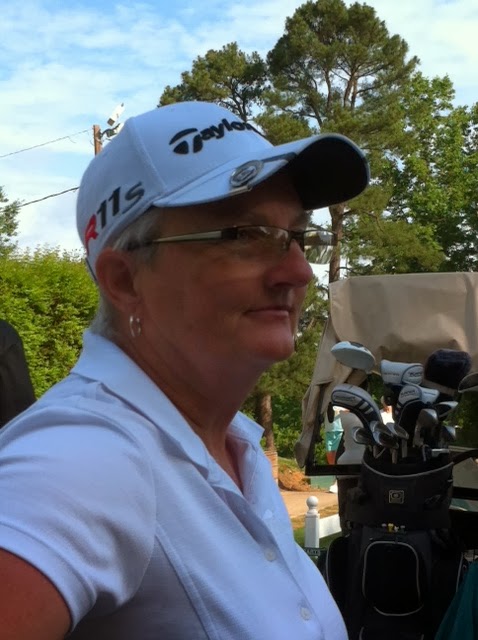I haven't written about this situation. I've resisted even talking about my diagnosis beyond my intimate circle of family and friends because I think there's something terribly unattractive about public discussions of personal medical conditions. For months, sharing my diabetes diagnosis casually fell into the same category as complaining about menstrual cramps in mixed teenaged company. Well-bred girls just don't do that.
Several events and a medical crisis have forced me to rethink this position, and to realize that there are valid reasons for going public with what I've regarded as a fundamentally private and personal medical condition. I'll begin with my realization that I'm not the only golfer who struggles with managing diabetes and a round of golf. Last night another member of the Google+ Golf Community, a loose confederation of more than 9000 lovers of golf who endlessly share their love and knowledge of the game with each other, posted a question to any other golfers who are living with diabetes: How do you manage your energy?
I responded privately to him immediately. That's been a central struggle for me over the past 12 months as I have played on, determined that diabetes WOULD NOT disrupt my golf game. As I explained to that other member of the Golf Community Ricky Potts has created the steps I've learned to take to manage my energy, I realized that this well-bred girl needs to reach beyond the boundaries of propriety and open a more public conversation about golf and diabetes.
Actually, this conversation could and should go well beyond diabetes, although that's a perfectly good starting point. Still, golf is a sport that can be played through one's lifetime and as we grow older we face inevitable challenges linked to the aging process. Those challenges, however, don't need to mark the end of our golfing.
Our joints begin to resist the physical demands of the game and we must address flexibility and the more efficient use of our body core. Ryan York has developed a wonderful set of exercises designed specifically for older golfers that have worked for this septuagenerian.
One of my favorite golf buddies walked away from the game because she didn't want to carry her nitro in her golf bag and she was struggling to get through an 18-hole round without a cardiac episode. Denial doesn't work, not with cardiac problems and not with diabetes, yet both are realities for those of us who believe being found face down on the 18th green with the ball in the cup is a desirable way to conclude this life. Baldev Singh provides some guidance for staying in the game after a heart disease diagnosis.
I've watched in awe and admiration as my generational peers have come back to the game after knee replacements, heart attacks, mastectomies, and rotator cuff surgery. Why should diabetes be any different?
 |
| Beast Miller Saw My Fatigue Level Months Before I Was Diagnosed With Diabetes |
It's taken me a year to get to this level of acceptance, and until I got there I watched with dismay as my drives got shorter, my attention span became erratic, and my index crept inexorably upward.
Be forewarned. Beast Miller noticed a decline in my energy level months before my physician delivered the diabetes diagnosis. I just started feeling limp mid-way through the back 9 and one day, when I was playing with Beast, she watched me drag off the tee box after a particularly flimsy attempt to drive the ball and observed, It looks like the F word to me.
The F word? What does the F word have to do with that drive, other than capture my general angst?
Fatigue, The Beast said. You've run out of juice before you've run out of holes.
The diabetes educator, who is also an active distance bicyclist, explained why I was running out of juice, and she gave me some excellent tools for sustaining my energy level. But like all tools, they're worthless until you learn to use them. I spent months getting from theory to practice. And I had to learn to accept help on this journey.
It took only 1 glucose crash for me to transfer the glucose tabs I'd dutifully purchased on the advice of the diabetes educator from my kitchen counter to my golf bag. Libby insisted that I actually show her the bottle before we teed off, so she'd know where to find them if it happened again.
Wes, worried that I would collapse on him in the middle of one of our viciously competitive rounds, introduced me to steel-cut oatmeal packed with raisins as the base meal for beginning a round of golf. It won't get me through the round, but it certainly gives me a strong start.
Barb taught me about the quick boost that a few grapes can provide. They don't last, but when I feel my body flagging, I can jump start my energy recovery with a grapes and follow that with some protein.

Reagan, who manages the snack bar, offered to bring a chicken salad sandwich out to me on the course on the day I didn't pack enough food.
Much as I might like for this to be a private matter, for me the key to managing my diabetes has been accepting the help and support of others.
I've resisted taking my glucometer to the golf course, and checking my glucose level during my round. But now I understand that as my disease progresses I may need to become willing to do that, if I want to stay in the game. And that's what this is about, after all's said and done.

No comments:
Post a Comment